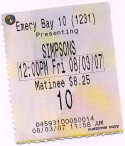
|
||||||||||||||||||||||||||||||||||||||||||||||||||||||
|
For example, the movie was too big to fit on the screen, about 20 percent of the picture, 10 percent on either side, was actually projected on the drapes. And the sound was muddy and tinny and soft. A movie would have to be pretty incredible to hold my attention in that environment. The movie industry needs to take a look at this. I suppose I'm in the minority, but I won't be for long. The prices on home entertainment equipment are dropping all the time, and word of mouth must be spreading. For $2K you can create an environment at home that's hugely better than the one in the theaters. Next year it'll probably be $1K. If anyone from Google is tuned in.... I'd like to evaluate the new beta Google Mashup Editor Contact me at scriptingnewsmail at gmail dot com. Thanks!
I drew a comparison to the explosive end of copy protection in the 1980s, but that's just one of many examples of the endless cycle of the tech industry. It's why we have booms and busts, it's how we achieve growth, how we shed layers in spring, and grow new fur in fall. Lock-in, it seems, will always be with us, if only so the users can express their independence by deleting it. The first time I saw explosive deconstruction was in the late 70s and early 80s when the personal computer rose out of the ranks of hobbyists. I came of age in a university that only had mainframes in the early-mid 70s. I graduated and got a job in the timesharing industry, where we rented out computer time on our mainframes. At the same time, in New Mexico, of all places, another direction was being explored, the idea of a fractional horsepower computer, where each person would have their own machine all to themselves. This idea had legs, big ones. A few years later, after learning Unix in Madison, I had my own computer, a 64K black box running UCSD Pascal on top of CP/M. Then I got an Apple II, an Apple III, an IBM PC and off to the races. A boom. But the boom got extra lift from the arrogant denial of the titans of the mainframe and minicomputer eras. Had they embraced the change instead of resisting it, the boom would have been much softer. But that never happens, or so it seems. (Bill Gates swore he'd not fall victim to it, but he has, over and over.) So when people give reasons why lock-in is forever, that's just part of the transition. I also remember how the web got started, and how many people thought it wouldn't work (I was one of them, btw, but not for long). This time the lock-in is not in the computer, although that's starting to happen again (the iPhone is a great example, but it'll be a short-lived product, I think, kind of like the Apple III or the Newton). It's not about base-level networking or content or presentation formats, that's been settled too (HTML and HTTP and RSS). This time the lock-in is about identity. So if the past is a guide to the future, how will identity deconstruct? It's simple. A vendor will come along and they'll store your identity but give you complete freedom to move it where ever you want when ever you want at no cost. They'll make it easy to do so. And they'll get rich doing it, if they want to. Why? "People come back to places that send them away." It's the basic trust proposition of the Internet. People will only trust a service that gives them complete freedom to come and go as they please. Further, they'll want to come back if you send them to cool places. It's why people like Facebook today, and why they'll be tired of it tomorrow, if it only sends you to places within the Facebook silo. If you look back to all the booms, they've all had that quality of freedom for everyone to do whatever they want. It's always that way with creativity. And you know the cycle is about to end when everything is controlled, when there are few outlets for creativity. When you wake up and sit down to work and don't feel like doing anything. That's when it's time to start thinking about blowing something up. Sting: "If you love someone, set them free." |
Dave Winer, 52, pioneered the development of weblogs, syndication (RSS), podcasting, outlining, and web content management software; former contributing editor at Wired Magazine, research fellow at Harvard Law School, entrepreneur, and investor in web media companies. A native New Yorker, he received a Master's in Computer Science from the University of Wisconsin, a Bachelor's in Mathematics from Tulane University and currently lives in Berkeley, California. "The protoblogger." - NY Times.
"The father of modern-day content distribution." - PC World.
"Helped popularize blogging, podcasting and RSS." - Time.
"The father of blogging and RSS." - BBC.
"RSS was born in 1997 out of the confluence of Dave Winer's 'Really Simple Syndication' technology, used to push out blog updates, and Netscape's 'Rich Site Summary', which allowed users to create custom Netscape home pages with regularly updated data flows." - Tim O'Reilly.
My most recent trivia on Twitter. Comment on today's On This Day In: 2006 2005 2004 2003 2002 2001 2000 1999 1998 1997.
|
|||||||||||||||||||||||||||||||||||||||||||||||||||||
|
© Copyright 1997-2007 Dave Winer. Previous / Next |
||||||||||||||||||||||||||||||||||||||||||||||||||||||

 Every day I dish up a number of topics, it's never clear to me which, if any, people will find interesting. Yesterday the
Every day I dish up a number of topics, it's never clear to me which, if any, people will find interesting. Yesterday the 


